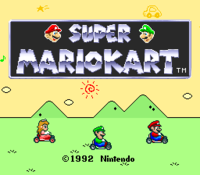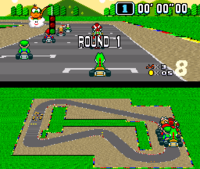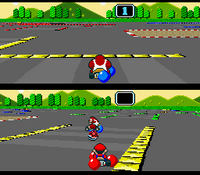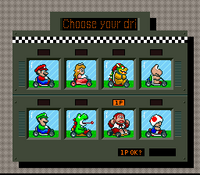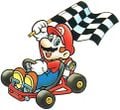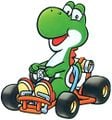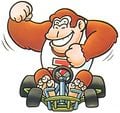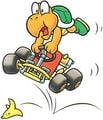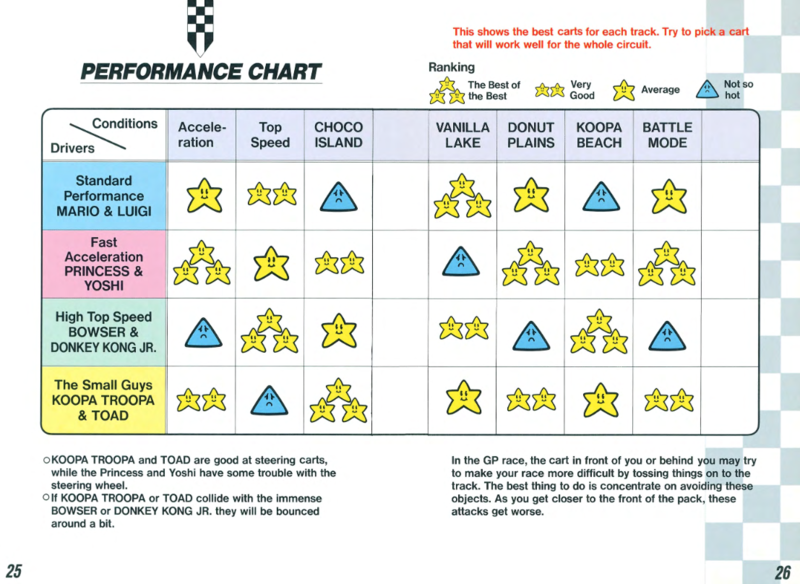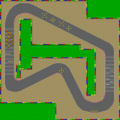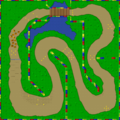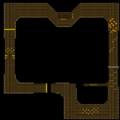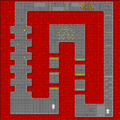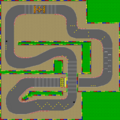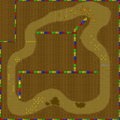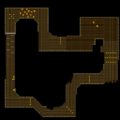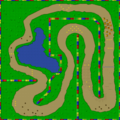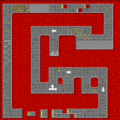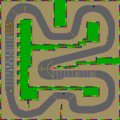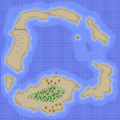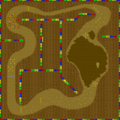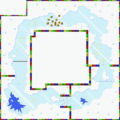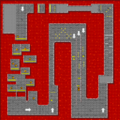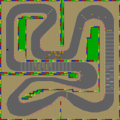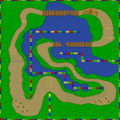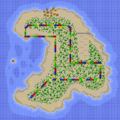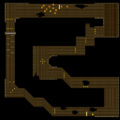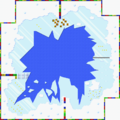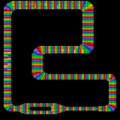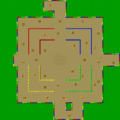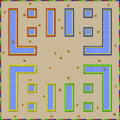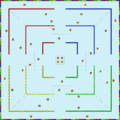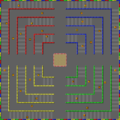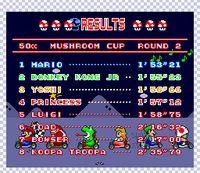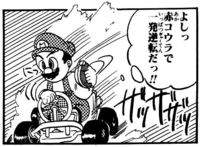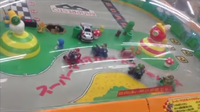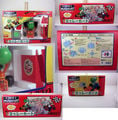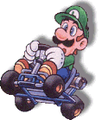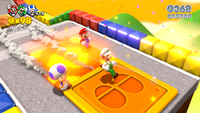Super Mario Kart: Difference between revisions
Numakuro2424 (talk | contribs) |
|||
| Line 1,296: | Line 1,296: | ||
*''[[Super Mario 3D World]]'': The level [[Mount Must Dash]] is based on the Mario Circuit courses from this game. The music from the Mario Circuit courses also is rearranged for that level. | *''[[Super Mario 3D World]]'': The level [[Mount Must Dash]] is based on the Mario Circuit courses from this game. The music from the Mario Circuit courses also is rearranged for that level. | ||
*''[[Mario Kart 8]]'': Part of the main theme is an orchestrated version of the main theme of ''Super Mario Kart''. The [[Pipe Frame]] returns with the single exhaust design. Also, the Coin item returns with the same function as it did in this game. [[SNES Donut Plains 3|Donut Plains 3]] returns as a retro track. The design of {{classic-link|N64|Rainbow Road}} and [[Rainbow Road (Mario Kart 8)|Rainbow Road]] for this game are very similar to [[SNES Rainbow Road|Rainbow Road]], which also appears in this game in the DLC cup, [[Triforce Cup]]. | *''[[Mario Kart 8]]'': Part of the main theme is an orchestrated version of the main theme of ''Super Mario Kart''. The [[Pipe Frame]] returns with the single exhaust design. Also, the Coin item returns with the same function as it did in this game. [[SNES Donut Plains 3|Donut Plains 3]] returns as a retro track. The design of {{classic-link|N64|Rainbow Road}} and [[Rainbow Road (Mario Kart 8)|Rainbow Road]] for this game are very similar to [[SNES Rainbow Road|Rainbow Road]], which also appears in this game in the DLC cup, [[Triforce Cup]]. | ||
**''[[Mario Kart 8 Deluxe]]'': The [[Cape Feather|Feather]] item returns with the same function. [[SNES Battle Course 1|Battle Course 1]] reappears as a retro battle stage; a billboard in the course background is modeled after the player select screen from ''Super Mario Kart''. | **''[[Mario Kart 8 Deluxe]]'': The [[Cape Feather|Feather]] item returns with the same function. [[SNES Battle Course 1|Battle Course 1]] reappears as a retro battle stage; a billboard in the course background is modeled after the player select screen from ''Super Mario Kart''. [[SNES Mario Circuit 3|Mario Circuit 3]] returns as a course in the [[Mario Kart 8 Deluxe – Booster Course Pass|Booster Course Pass]] for ''Mario Kart 8 Deluxe''. | ||
*''[[Super Smash Bros. for Wii U]]'': ''Super Mario Kart'' appears as a masterpiece in this game. | *''[[Super Smash Bros. for Wii U]]'': ''Super Mario Kart'' appears as a masterpiece in this game. | ||
*''[[Super Mario Maker]]'': The invincible theme from ''Super Mario Kart'' is used when the Mario Kart costume uses a Super Star. Also, the race start fanfare is heard when Mario picks up the [[Mystery Mushroom]]. The 1st-4th place (course clear) and 5th-8th place (death) jingles are also heard. Ironically, when Mario is moving, the kart's engine sound is actually coming from Bowser and Donkey Kong Jr.'s karts, rather than his and Luigi's. | *''[[Super Mario Maker]]'': The invincible theme from ''Super Mario Kart'' is used when the Mario Kart costume uses a Super Star. Also, the race start fanfare is heard when Mario picks up the [[Mystery Mushroom]]. The 1st-4th place (course clear) and 5th-8th place (death) jingles are also heard. Ironically, when Mario is moving, the kart's engine sound is actually coming from Bowser and Donkey Kong Jr.'s karts, rather than his and Luigi's. | ||
Revision as of 08:55, July 29, 2022
- This article is about the game for the Super Nintendo Entertainment System. For the microgame from WarioWare Gold of the same name, see Super Mario Kart (microgame).
- Not to be confused with Super Mario Kart Tour.
- "SMK" redirects here. For the manga, see Super Mario-kun.
| Super Mario Kart | |||||||||||
|---|---|---|---|---|---|---|---|---|---|---|---|
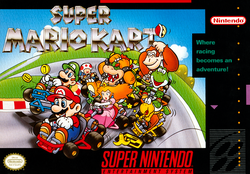 North American box art For alternate box art, see the game's gallery. | |||||||||||
| Developer | Nintendo EAD | ||||||||||
| Publisher | Nintendo | ||||||||||
| Platform(s) | Super Nintendo Entertainment System, Virtual Console (Wii, Wii U, New 3DS), Super NES Classic Edition, Super Nintendo Entertainment System - Nintendo Switch Online | ||||||||||
| Release date | SNES: Template:Release Player's Choice: Template:Release Virtual Console (Wii): Template:Release Virtual Console (Wii U): Template:Release Virtual Console (New 3DS): Template:Release Super NES Classic Edition: Template:Release Super Nintendo Entertainment System - Nintendo Switch Online: Template:Release Fully souped up!: Template:Release[?] | ||||||||||
| Language(s) | English (United States) Japanese | ||||||||||
| Genre | Racing | ||||||||||
| Rating(s) | SNES:
| ||||||||||
| Mode(s) | 1-2 players | ||||||||||
| Input | Super NES: Wii: Wii U: Nintendo Switch: Nintendo 3DS: Super NES Classic Edition:
| ||||||||||
Super Mario Kart is a racing game for the Super Nintendo Entertainment System, which was first released in 1992 and re-released in 1996 as a Player's Choice title, being the first title in the line up. Unlike the other racing games at the time, which focused on single-player racing with more complicated tracks, Super Mario Kart was focused on two players and was designed to be an easy and intuitive "pick up and play" experience that heavily involves the use of acquiring weapons on an obstacle course-like track to impede another player's progress. The development of a one-on-one Battle Mode was invented as another way to enjoy the competitive aspects of the game. Another notable aspect of the game is its Mode 7 graphics, where the game simulates a 3D plane by rotating and scaling a background graphic on a scanline-by-scanline basis, allowing players to simulate driving in a 3D environment. Much of this game is heavily based on Super Mario World with both graphics and general themes being taken from this game. This includes sprites reusing assets from Super Mario World as well as the game's soundtrack rearranging several Super Mario World melodies.
The game's success spawned the hugely influential Mario Kart series, while also helping to pioneer the kart-racing genre. The game's success has also influenced the greater Mario franchise, with elements from it appearing throughout it. Examples of these kinds of elements include a level designed after Super Mario Kart's courses appearing in Super Mario 3D World as well as Rainbow Road making an appearance in Paper Mario: Color Splash. Super Mario Kart's use of a wider cast of characters such as Bowser and Peach was the first of many multiplayer-oriented Mario spin-off titles that included a diverse, playable cast of Mario characters such as those from the Mario Tennis and Mario Party series. Additionally, the game has been ranked as one of the greatest games of all time by various organizations due to its aformentioned legacy and its ground-breaking gameplay.
Super Mario Kart was re-released on the Wii's Virtual Console in 2009-2010, on the Wii U's Virtual Console in 2013-2014, on the New Nintendo 3DS's Virtual Console in 2016, is one of the 21 titles included on the Super NES Classic Edition, and is one of the 20 launch titles for Super Nintendo Entertainment System - Nintendo Switch Online, which also released a special version titled Super Mario Kart: Fully souped up! with 150cc and the Special Cup unlocked on May 26, 2021.
Gameplay
Players select a Mario character out of a cast of 8 characters with which to race (or battle in Battle Mode) against opponents; each racer has their own stats which determine how they control, though these are not displayed in-game. Players then race or battle against their opponents, depending upon which game mode is chosen. Integral to the gameplay is the item system, where players can pick up items from Question Blocks clustered around parts of the track. The item obtained is dependent on the player's position in the race. For example, players farther behind obtain stronger items such as the invincible, speed-raising Star or the Lightning that can shrink all racers, while players farther ahead receive the basic Banana Peels and Green Shells items. Question Blocks get depleted whenever a player runs over them, and they do not respawn their items until all Question Blocks in the track have been depleted.
At the start of the race, players can rev their kart up for a a boost, though if they rev up too much, they begin the race by accelerating much slower. Players can hop if they press either or
. If they hold the button after hopping while holding either left or right, they can power slide, which enable them to drive through harder turns while losing less speed than steering normally through them. A slight drift is also possible by hopping and only holding either the left or right button. While karts in this game can brake with
, they cannot go in reverse: players need to perform a U-turn or hop around to go backwards. Some tracks feature water that players can fall into: if players fall into these areas, they are able to move around for a little while before eventually being picked up by Lakitu. Players immediately get rescued by Lakitu if they fall into pits or into lava, however.
While driving the course, coins can be picked up, which increase the player's top speed as well as shield them from other racers. If a player runs into another racer while they have zero coins, they spin out; however, if a player runs into another racer while they have several coins, they simply lose one coin while still being able to continue driving. Having ten coins gives the player the maximum amount of speed they can possess, though they are still able to collect additional coins without gaining any additional speed. Players start each race with a number of coins depending on their rank: first and second start with two coins, third and fourth start with three coins, fifth and sixth start with four coins, and seventh and eighth start with five coins. Players lose four coins if they are hit with an item, they lose two coins if they are picked up by Lakitu by falling off the track, and they lose one coin if they bump into another racer. The number of coins found on each course varies from one course to another.
Three speeds are available: 50cc, 100cc, and 150cc. 50cc is the slowest and therefore easiest difficulty while 150cc is the fastest and hardest engine class that must be unlocked by clearing all cups in the 100cc engine class which has a medium level of speed and difficulty. Vehicles in all modes outside of Mario Kart GP use 100cc engines.
The game is always split in two screens. The top screen is the main screen that players see the gameplay in while the bottom screen displays an overhead map, displaying progress of all characters. If players press or
, they can switch the overhead map to a backwards view. When two players are playing, the bottom map is replaced by the second player's screen.
If players want to delete their save data, they need to press ,
,
, and
at the title screen. If players want to delete just Time Trial records, they can go to the course records they wish to delete and press the same button combination.
Controls
| Action(s) | |||||||
|---|---|---|---|---|---|---|---|
| SNES | Wii (Classic Controller) | GameCube Controller | New Nintendo 3DS | Wii U | Nintendo Switch (Dual Joy-Con / Pro Controller) | Nintendo Switch (Single Joy-Con) | |
| Change option during the Menus/Steer | / | ||||||
| Use items, stop Item Roulette | |||||||
| Accelerate | |||||||
| Switch view | / | / + | |||||
| Brake | |||||||
| Jump / Drift | / | / | |||||
| Pause / Select | + |
Game modes
Mario Kart GP
The Mario Kart GP is the main mode in Super Mario Kart. Here, up to two players can race against seven other CPU-controlled opponents in a five-course cup; they first start out in eighth place and must make their way to the top position; players keep their position for the next race if they end in that position. The top four players receive points based on their ranking: first place earns the player nine points, second earns six, third earns three, and fourth earns one, while fifth and below get zero points. Players who rank fifth or below lose one of three lives. If both players rank fifth or below, the race must be tried again. If the player ranks fifth or below without any lives left, the game ends. A single extra life can be earned by placing in the same position three times. The maximum score in a GP cup is forty-five, obtained by winning five times. The three best drivers move on to the award ceremony where they receive their trophies. Third place gives the player a bronze trophy, second gives silver, and first gives gold (the player can watch the ceremony only when they place first: however, a protoype version has animations for second and third). Each race is five laps long.
If players beat all of the cups in the 100cc engine class, the message "Excellent driving, you are now a Super Mario Kart expert" pops up, thus officially telling players that they have completed all four of the cups. If the player wants a harder challenge, they can now replay through the game in the 150cc engine class. If players beat all of the cups in the 150cc engine class, the same message as before pops up. If the player wants a more difficult challenge, they can hold and
at the character selection screen. This makes the character permanently small as if under the effect of a Lightning or Poison Mushroom until the player presses the buttons again.
Time Trial
This one-player mode have the player to race through five laps of the selected track the fastest they can without items or coins in the 100cc engine class. The five lap times are recorded which are then combined to make the total time, as well as the fastest lap time and the characters used, for each track.
If the player enters the cheat code ,
,
,
,
,
,
,
,
on the cup selection menu in Time Trial, the Special Cup is unlocked. In the Japanese version, a Boo sound is heard upon successfully inputting the code.[1]
Match Race
This mode is two-player only: the players can race each other like in GP, except CPU racers do not appear and players can freely choose the track to race in. Bullet Bills slide around the courses as well, and coming in contact with one results in the kart spinning out and the object disappearing as if it were a Green Shell. The game keeps track of wins and losses of each player.
Battle Mode
- Main article: Battle Mode
A two-player exclusive mode where players combat each other with items in an arena. The goal is to eliminate the opposing player's balloons, which are represented by colored spheres rotating around the character. Each player has three balloons that cannot be recovered. The first to pop all the opponent's balloons wins.
Characters
The game features eight playable characters from the Mario franchise, such as Mario, Luigi, Yoshi, and Bowser. However, some other characters from the series act as obstacles in the game's tracks, like Thwomps, Gophers, Piranha Plants, Bullet Bills, and Flopping Cheep Cheeps. Ghosts do not act as enemies, but both as item and as part of the Ghost Valley tracks' background. Yoshi, Bowser, and Donkey Kong Jr. are the only drivers in this game to have their own taunts when surpassing other racers regardless if they are being used by the player or CPU. The others do not have their own taunts and instead the standard beep is heard when surpassing other racers, but can only be heard when used by the player.
As stated in the game's manual, Lakitu is the owner of all the racetracks, thus overseeing all races. He appears on the track to start the race, to warn the player if they are going the wrong way on the course, and when they fall off the edge of the track or go out of bounds. If the latter happens, Lakitu transports the racer back onto the course at the price of two Coins. A Cheep Cheep balloon distributes the trophy to the GP winner.
Drivers
Super Mario Kart has eight available drivers, divided into statistically identical pairs of two. While subsequent Mario Kart games would classify characters based on weight class, in this game other criteria are used. The stats presented here are derived and inferred from the manual.[2] The Bros are average drivers with a high top speed, The Dragon and The Lady have the highest acceleration with low handling, The Showdown have low acceleration and handling with the highest top speed and weight, while The Small Guys have high acceleration and handling, which makes them recommended for beginners. Each pair of characters has different engine sounds for their karts, which reflect their appearances and characteristics. All drivers also have a unique theme music whenever they finish a race with a good position.
On a side note, this is one of only two Mario Kart games to feature Donkey Kong Jr. as a playable character (subsequent installments have replaced him with Donkey Kong), the other being Mario Kart Tour.
|
|
|
|
Maximum speed
The Japanese Official Nintendo Guidebook of the game lists the maximum speed in the 100cc engine class in various conditions.[3] This maximum speed is increased by 1 km/h per each coin collected, until 10 coins are collected.[4]
| Maximum speed in the 100cc engine class | |||||||
|---|---|---|---|---|---|---|---|
| Driver | Maximum speed (km/h) | ||||||
| Normal road | Circuits' sand | Choco Island's rocks | Choco Island's mud | Donut Plain's grass | Koopa Beach's water | Vanilla Lake's snow | |
| Mario Luigi |
130 | 84 | 40 | 90 | 82 | 82 | 76 |
| Princess Yoshi |
125 | 88 | 44 | 94 | 86 | 86 | 70 |
| Bowser Donkey Kong Jr. |
135 | 86 | 42 | 92 | 80 | 88 | 74 |
| Koopa Troopa Toad |
120 | 90 | 46 | 96 | 84 | 88 | 72 |
Acceleration
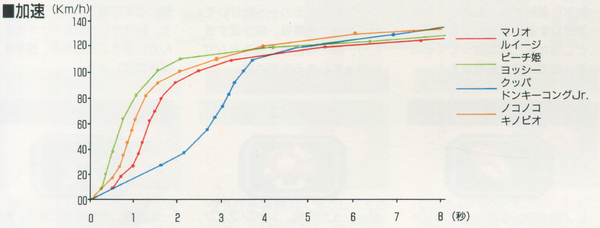
Performance chart
The official instruction manual illustrates a chart that details how well characters perform on tracks and their stats. It notes that Toad and Koopa Troopa have the best steering while the Princess and Yoshi steer worse. Another point it mentions is that Toad and Koopa Troopa can get knocked aside by Bowser and Donkey Kong Jr.
Non-playable
| Characters and elements | ||
|---|---|---|
| Character/element | Location | Description |
Bullet Bill |
N/A | Appears in Match Races where they bounce back and forth between two walls and causes racers who drive into them to spin out. |
Flopping Cheep Cheep |
Koopa Beach | Out-of-water fish that spins players out if they come in contact with them. |
Ghosts |
Ghost Valley, appears as an item | Background elements in the Ghost Valley courses. They also appear as an item in Match Race and Battle Mode. |
Gopher |
Donut Plains | Gophers attach themselves onto racers if ran into, which cause them to lose speed and coins. Players must hop repeatedly to get them off. |
Lakitu |
N/A | A helpful track manager who oversees the race. He starts the race up, pulls racers out of lava, water, and pits, tells players that they are going the wrong way, and waves a checkered flag for a racer who has finished. |
Piranha Plant |
Choco Island | A carnivorous plant that acts like a stationary obstacle. Players who run into them spin out. |
Thwomp |
Bowser Castle, Rainbow Road | A hovering rock that stays stationary in the first lap of a course. In subsequent laps, they slam onto the floor in a pattern, and any racer caught in them get flattened. Flashing variants of Thwomps called Super Thwomps appear in Rainbow Road and act identically to Thwomps, though touching them causes racers to spin out, unlike regular Thwomps. |
Courses
The game has 20 race courses and 4 battle courses, the former being divided in four cups. Super Mario Kart is the only game in the Mario Kart series to have five courses per cup, as opposed to four in later games.
Race courses
Aside from Rainbow Road, all of the courses are numbered. In the credits, each character is assigned a course.
Some common hazards include the following:
- Water: Racers who fall in have a few seconds to drive out, before Lakitu picks them up. Koopa Beach contains shallow water that is safe to drive through. In Vanilla Lake, racers appear frozen when they are fished out.
- Lava: Racers who fall in immediately get picked up by Lakitu.
- Abyss: Racers who fall immediately get picked up by Lakitu.
- Destructible blocks: Walls that get destroyed when struck in Ghost Valley and Vanilla Lake.
- Dirt: Decreases traction when driven on in Donut Plains.
- Chocolate Mud: Decreases traction and slows speed when driven on in Choco Island.
| Name | Terrain and obstacles | |
|---|---|---|
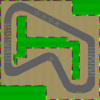
|
Mario Circuit | |
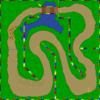
|
Donut Plains | |
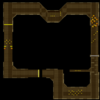
|
Ghost Valley |
|
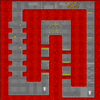
|
Bowser Castle | |
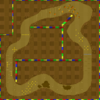
|
Choco Island |
|
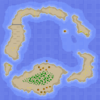
|
Koopa Beach |
|
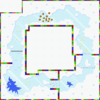
|
Vanilla Lake |
|
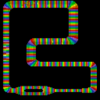
|
Rainbow Road |
|
Course features and obstacles
| Feature | Description |
|---|---|
 Coin |
These are scattered throughout the course and increase the player's speed as well as give them durability against opponents. They do not respawn once taken. |
Jump |
Players hop if they drive over this. Driving over it at high speeds causes racers to jump higher and farther. |
Oil Slick |
Located in the Mario Circuits, players spin out if they drive over them. |
Pipe |
Stationary obstacles found in Mario Circuit, Vanilla Lake, and Donut Plains that act as walls and slow players down when struck. |
 Question Block |
These panels gives players an item if driven over. Once they are driven over, they are depleted until all Question Blocks in the course get depleted, in which they all respawn. |
Zipper |
Zippers give a burst of speed for players who drive over it. |
Battle courses
Items
Items are obtained through Question Blocks scattered around the tracks. When the player passes over one, it deactivates until all other Question Blocks are used. Once a racer passes over one, with a few exceptions, they receive an item in their box from the following:
| Item | Description | Notes |
|---|---|---|
Banana Peel |
When a kart hits a Banana Peel, it spins out. | Can be thrown backward and forward. Also used by Donkey Kong Jr. if he is CPU-controlled. |
Green Shell |
The Green Shell sends an enemy into a spin if they are hit. Green Shells can bounce off barriers. Throwing it backwards causes it to remain stationary. | Can be thrown backward and forward. Used by Koopa Troopa if CPU-controlled, but they behave similar to Banana Peels even when thrown forward, and remain stationary. |
Red Shell |
The Red Shell acts similarly to a Green Shell, but homes in on the target instead. It does not bounce off walls, however. | Can be thrown only forward. |
Feather |
A Feather allows the user to perform a high jump, high enough to take normally impossible shortcuts and to sail over obstacles and other racers. | Can be used by every CPU. |
Mushroom |
The Mushroom is a more common item than a Feather or a Star, and grants the user a slight boost. It can either be used to slam an opponent or drive over hazards such as sand and grass without losing speed. When using a Mushroom in front of a jump pad, the jump is higher and farther. | |
Star |
The Star provides two benefits, allowing the user to receive a small speed boost and to become invulnerable to everything. Contact with other racers causes them to spin out. | Used also by Mario and Luigi if they are CPU-controlled. They do not receive a speed boost, however, and the effect does not last as long. |
Ghost |
The Ghost turns the user transparent for a few seconds and steals an opponent's item. | Exclusive to Battle Mode and Match Race. |
Coin |
The Coin adds two coins to the total coin count, increasing the user's overall top speed. | Does not appear in Battle Mode and Time Trial. Maximum benefit is achieved with 10 coins. |
Lightning |
The Lightning Bolt shrinks all the racers except for the user, making them slower and vulnerable to being squashed by normal sized racers. The effect wears off after a brief period of time. | Does not appear in Battle Mode. |
Egg |
Works similar to a Banana Peel. | Usable only by Yoshi if he is CPU-controlled. |
Fireball |
Similar to a Banana Peel, but oscillates from left to right on the spot, making them harder to pass safely. | Usable only by Bowser if he is CPU-controlled. |
Poison Mushroom |
A stationary item. If one is run into, the victim shrinks, as if hit by a Lightning Bolt. Shrunken racers who run into it revert to normal size. | Usable only by Princess and Toad if they are CPU-controlled. |
Probabilities
The following tables are derived from the Japanese Nintendo Official Guidebook of the game and report the probability of obtaining each item in the various modes with letter codes ranging from A (most likely) to F (unlikely).[5] In the races, the probability of obtaining an item depends on the track theme, on the current lap and on the rank of the driver, while in Battle Mode the probability is not affected by any factor.
Mario Kart GP
In Mario Kart GP races, during the first lap all the drivers receive items with the same probabilities they would obtain if they were in first place, regardless of their rank.
Match Race
Battle Mode
| E | D | E | E | A | A | E |
Rivals
Super Mario Kart has a different rival system from the rest of the series (except for Mario Kart: Super Circuit); the rivals contain one very fast driver, one fast driver, one medium driver, one slow driver and three very slow drivers. It is notable that when one of the three slowest drivers gets hit, that kart keeps its place, while when one of the faster cars gets shot, it usually resumes its previous place very quickly unless unable to catch up fast enough before the race ends. For this reason, the drivers (except the human racer) are expected to finish in a particular order if unaffected. Also, if the player tries to hit an opponent, the opponent may jump over the item similar to when they jump over CPU-placed items. Also, the rivals are not determined in pairs, so that even if Donkey Kong Jr. is Mario's rival, Mario is not Donkey Kong Jr.'s rival, as shown in the table below.
The rivals for each driver are always the same, the list is in the order the line up for the first race. It is possible to change the order if the rivals cannot recover their place at the end (for example, if someone is playing as Luigi and Yoshi finishes last, Yoshi then becomes one of the three slower drivers while everybody takes the next position up). It happens mostly on 100cc and 150cc.
The rivals are determined by the current points standing, meaning that if Yoshi was still only second to the player, he boosts back to first position from the start.
Staff
- Main article: List of Super Mario Kart staff
The staff for Super Mario Kart has consisted of 15 members. Super Mario Kart was directed by Tadashi Sugiyama and Hideki Konno, the latter who would go on to play prominent roles in later main entries of the Mario Kart series with the exception of Mario Kart: Double Dash!! Yoichi Kotabe, Mie Yoshimura, and Yoshiaki Koizumi has provided the illustrations for the game. Soyo Oka has composed the game's soundtrack, with Rainbow Road being one of her favorite compositions.[6]
Development
Super Mario Kart was born out of the idea of making a two-player racing game following F-Zero, which was exclusively single-player.[7] The team wanted to make a fun, multiplayer-oriented alternative and was aimed to be enjoyed "with family and friends." according to Nintendo Producer Hideki Konno.[8] The prototype initially only featured a generic "guy in overalls". The design for the characters onscreen were three heads tall as opposed to F-Zero's seven heads tall to suit the design of the karts. At first, there was no racing involved; it was a test of two karts moving freely. The decision to include Mario characters and concepts was made three to four months in development, when the developers added Mario driving one of the karts moving around because they were curious about how the game would look, and decided that it looked better.[7] Before Banana Peels were added, oil cans that spill their substance out were used to spin karts out. The battle mode was implemented because the developers thought it would be a good idea to include a form of one-on-one battles that did not involve competing for ranks during the races.[7]
Pre-release and unused content
- Main article: List of Super Mario Kart pre-release and unused content
A prototype cartridge of the game features several differences, such as the presence of animations on the podium screen when the player ranks 2nd or 3rd place, a music track for Vanilla Lake 1 that does not appear in the final build and a different Battle Course 3 set in Choco Island.
Regional differences
Several graphical changes consisting of minor touch-ups and even censoring of questionable material has been made to international versions of the game.
- The logo in the title screen for international versions have an enlarged "O" and "E" in the title, "Super Mario Kart" and overall increased box size. The trademark symbol is in a different position as well.
- In Super Mario Kart, every character has a winning animation that involves a bottle of champagne. In the Japanese version, Bowser and the Princess drink champagne in their animations (with the latter becoming drunk in the process), which goes against Nintendo of America's policy on the depiction of alcohol, as it was considered inappropriate for younger children.[9][10] In the Western releases of the game, Bowser merely poses happily and Peach tosses and catches her bottle.
- Yoshi has a more defined head in the North American versions of the game. The European version retains the Japanese version's head.
- International versions of the game save the player's choices, having them already selected the next time they go through menus.
- The Japanese version plays a Boo sound when
,
,
,
,
,
,
,
,
are pressed on the Time Trial menu in order to unlock the Special Cup early. No sound is played in the international versions.
- Karts are stalled less when they are overreved at the start of the race in the North American version of the game.
Glitches
- Main article: List of Super Mario Kart glitches
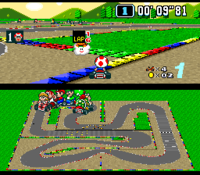
Continue boost
The player should pick up a Mushroom, then use it and hop very close to a corner. If done correctly, the effect of the Mushroom lasts longer than normal. The player can get a time of a lap under 10 seconds.[11]
Glitched lap counter
When some glitches are performed, occasionally Lakitu shows glitched lap counters, such as "LAP 05" or, rarely, "LAP 16". "LAP" is normal, but the part of the panel that displays the lap number is missing, and the digits are small, stacked, and displayed in red.[11]
Turn off music
In any two-player game, after Lakitu gives the green light, the player must keep mashing in both controllers. Occasionally, the music does play.
Reception
Critical reception
Super Mario Kart met with very favorable reviews, scoring a 93.60% on GameRankings based on 10 reviews.[12] Much of the praise of the game has been attributed to its bright and colorful graphics, fun gameplay involving its items that set it apart from F-Zero, intuitive controls, its Mario franchise theming, and retroactively, its legacy that helped pioneer the kart-racing genre and the overall introduction of the Mario Kart series. While Super Mario Kart does not have an official Metacritic entry due to the game coming out before its inception, the user score for the Wii Virtual Console is mixed, scoring 7.4, with common laments being that while the game is regarded as a classic, it is outclassed by later Mario Kart entries.[13]
Shey Stevens from the magazine, Electronic Games gave the game a 93%, citing how the game changes up mechanics from F-Zero such as the item-based system to deliver a unique experience. Stevens has additionally praised the one-on-one combat modes the game offers.[14] A section by Bro. Buzz from the Game Pro magazine has given the game a score of 5.0 in graphics, control, and fun factor and a 4.0 in sound, ending with, "Super Mario Kart makes wheel-spinning, bumper-grinding, motor racing actually cute! The little guys definitely have a lot of drive."[15] Nadia Oxford from USgamer, reviewing the game's release on the Super NES Classic Edition, has called the game "the SNES Classic Edition's most perfect inclusion." and has generally praised how well the game is held up, despite its simplicity compared to later Mario Kart entries, with Mario Kart 8 Deluxe being compared to in the review.[16] The flaw Oxford has cited was the single-player splitscreen and the fact that the game supports only two players rather than four. Electronic Gaming Montly has given the game an Editor's Choice award in its November 1992 issue.[17]
Super Mario Kart has seen frequent placements in Top Games lists. The game was placed 32nd in the 100th issue of Nintendo Power's "100 best Nintendo games of all time" in 1997.[18] In the book, Guinness World Records: Gamer's Edition for 2009, Super Mario Kart was placed as the #1 best console game. The game was placed 33rd in the 200th issue of GameInformer's "Top 200 Games of all Time" in December 2009. The game was awarded the Most Critically Acclaimed Mario Kart Game by Guinness Book of World Records Gamer's Edition 2009 - 2014.
| Reviews | |||
|---|---|---|---|
| Release | Reviewer, Publication | Score | Comment |
| SNES | Shey Stevens, Electronic Games | 93% | "Super Mario Kart has a fast-paced feel with plenty of in-depth play. While the game isn't totally revolutionary, the action does deviate from what we've exposed to in the past to make this new driving adventure something worthwhile to add to a collection, whether you're a fan of driving titles or Mario." |
| SNES | Karn Spydar Lee Bianco, Cubed3 | 9/10 | "It's the original ultimate racer, it has everything you could ever want then adds some more and that all important 'Nintendo difference'. It's hard to express in words how perfect this game is, you really MUST play it right NOW." |
| SNES | Jason Venter, HonestGamers | 5/5 | "Chock full of great visuals, awesome sound, tight play control, amazing track design, items galore and a multi-player mode that's hard to beat, Super Mario Kart is my favorite game of all time. It’s also one of the main reasons to own a Super Nintendo." |
| SNES | Brett Alan Weiss, allgame | 5/5 | "Super Mario Kart has spawned numerous imitators over the years, but it finishes in front of the pack every time." |
| Wii | Nintendo Life Staff, Nintendo Life | 9/10 | "Super Mario Kart has certainly made its mark on gaming history, spawning several sequels on successive Nintendo consoles, not to mention many imitators. To play it today is every bit as enjoyable as it ever was; sure the graphics and sound may have dated, but the core gameplay is still top notch. This is one hell of a fun racing game with enough playability to keep you coming back for more. It's amazing that Nintendo chose to wait three years before treating us to this seminal game on the Virtual Console, but we're glad they finally saw sense!" |
| Wii | Lucas M. Thomas, IGN | 9/10 | "Where each of the N64, Cube and Wii installments of the series have focused on multiplayer, more characters and more crazy items, though, this SNES original keeps things simpler -- emphasizing, instead, the actual racing instead of the combat within each race. It's a different take on the same idea, which is interesting since it's the original take on that idea. So stick with the other Kart games if you want the multiplayer chaos, but come on back to this very first racing adventure with Mario and his crew. It's absolutely worth 800 of your Wii Points to re-experience, or to play for the very first time." |
| Super NES Classic Edition | Nadia Oxford, USgamer | 4.5/5 | "Super Mario Kart is pretty bare-bones compared to its feature-laden sequels, but in many ways, its simplicity is its strength. Super Mario Kart's core concept is still a whole lot of rad fun, and that's what matters most." |
| Aggregators | |||
| Compiler | Platform / Score | ||
| GameRankings | 93.60% | ||
Sales
Super Mario Kart is the 4th best-selling game for the Super Nintendo Entertainment System, selling 8.76 million copies worldwide as of December 31, 2009.[19]
Adaptations in other media
Super Mario 4koma Manga Theater
Super Mario Kart is occasionally referenced in the gag comic series, the Super Mario 4koma Manga Theater, alongside other Mario titles.
Super Mario-kun
The sixth volume of the Super Mario-kun by Yukio Sawada completes the Super Mario World arc, though it contains a story that is heavily based on Super Mario Kart; the title even bases its Mario artwork off official artwork of the game.
Super Mario Kodansha manga
Three volumes feature Super Mario Kart in Kodansha's Super Mario series by Kazuki Motoyama. The first volume's cover features the cast driving on Rainbow Road.
Super Mario Kart Dokidoki Race
Super Mario Kart was adapted into a Japan-only electro-mechanical arcade game developed by Banpresto and Atlus called Super Mario Kart Dokidoki Race, released in 1994.[20] The playable characters are Mario, Luigi, Princess Peach, Yoshi, and Bowser, with Cheep Cheep, Monty Mole, and Lakitu in supporting roles. The game seems to operate on magnets to move the karts and is based on chance by who can press a series of buttons fast enough. There are five music tracks in total, two in particular being the music for the title screen and the Mario Circuit theme. The latter theme is sped up and has additional notes that play throughout the track with an ending note. A male announcer voice can also be heard throughout the gameplay. The other three music tracks are a preparation theme and two different victory themes.[21]
Merchandise
Due to the game's popularity and success, multiple merchandise based on Super Mario Kart has been sold. Diecast kart racers are frequent merchandise, with a few plush dolls.
A set of figurines including Bowser, Luigi, Peach, and Donkey Kong Jr.
A plushie of Lakitu
Gallery
- For this subject's image gallery, see Gallery:Super Mario Kart.
Mario vs. Bowser
Soundtrack
While Super Mario Kart has no officially released dedicated soundtrack, it is featured in various compilation soundtracks. Super Mario Compact Disco, a compilation soundtrack featuring tunes from mulitple Mario titles released in August 1993, features a hip hop-styled remix of the title screen music from Super Mario Kart. In the 'Nintendo Sound Selection series, Nintendo Sound Selection Vol.2: Loud Music contains the Bowser Castle music, titled simply "Castle".
For the instruments in the soundtrack, samples from the Roland D-550 synth and Roland R-8 drum machine were used, along with the Yamaha TG77 and an Akai sampler.[22]
Media
- For a complete list of media for this subject, see List of Super Mario Kart media.
| File info 0:30 |
| File info 0:30 |
| File info 0:30 |
| File info 0:14 |
References to other games
- Donkey Kong Jr.: Donkey Kong Jr. appears as a playable character.
- Super Mario Bros.: Mario's theme is a slight variation of part of the overworld theme from this game.
- Super Mario Bros.: The Lost Levels: The computer-controlled Toad and Peach are able to throw Poison Mushrooms, which are not usable by the player.
- Super Mario World: Several sound effects from this game are reused. The music for the Ghost Valley and Bowser Castle courses are remixes of the music from the Ghost Houses and the final boss theme, respectively, in this game. Most of the races take place in Dinosaur Land. Also, sprites such as Lakitu's bear a resemblance to their Super Mario World sprite. The Cape Feather appears as a usable item.
References in later games
- Mario Kart 64: The title music from Mario Kart 64 is a slower and elongated arrangement of the title music from Super Mario Kart. Also, part of Banshee Boardwalk's music is a rearrangement of the music used for the Ghost Valley courses in Super Mario Kart.
- Mario Kart: Super Circuit: All twenty courses appeared in this game, but all of their track hazards have been removed, Item Boxes are at different places than where Question Blocks laid and some tracks changed a little. The music for all tracks is redone for the Game Boy Advance. Also, part of the music for Boo Lake/Broken Pier and Rainbow Road is a rearrangement of the music from the Ghost Valley and Rainbow Road courses in this game, respectively.
- Mario Kart: Double Dash!! - The game's title can be seen as a sponsor in some tracks, such as Dry Dry Desert and Mushroom City.
- Mario Kart DS: Mario Circuit 1, Donut Plains 1, Koopa Beach 2, and Choco Island 2 all return in this game.
- Super Smash Bros. Brawl: An arrangement of the Mario Circuit theme plays on the Mario Circuit stage. Many trophies are from this game. The Banana Peel and Lightning Bolt appear as items in this game.
- Mario Kart Wii: Ghost Valley 2 and Mario Circuit 3 return as retro tracks and Battle Course 4 returns as a retro battle stage.
- Mario Kart 7: Collecting coins also returns from this game. Mario Circuit 2 and Rainbow Road return as retro tracks. Also, the rival system returned in this game. The kart now called Pipe Frame, returns in this game as an kart body, however it uses the dual exhaust design from Mario Kart 64 instead of the single exhaust from Super Mario Kart.
- Fortune Street: The theme for the Mario Circuit board is an arrangement of Mario Circuit's music from Super Mario Kart.
- Super Mario 3D World: The level Mount Must Dash is based on the Mario Circuit courses from this game. The music from the Mario Circuit courses also is rearranged for that level.
- Mario Kart 8: Part of the main theme is an orchestrated version of the main theme of Super Mario Kart. The Pipe Frame returns with the single exhaust design. Also, the Coin item returns with the same function as it did in this game. Donut Plains 3 returns as a retro track. The design of N64 Rainbow Road and Rainbow Road for this game are very similar to Rainbow Road, which also appears in this game in the DLC cup, Triforce Cup.
- Mario Kart 8 Deluxe: The Feather item returns with the same function. Battle Course 1 reappears as a retro battle stage; a billboard in the course background is modeled after the player select screen from Super Mario Kart. Mario Circuit 3 returns as a course in the Booster Course Pass for Mario Kart 8 Deluxe.
- Super Smash Bros. for Wii U: Super Mario Kart appears as a masterpiece in this game.
- Super Mario Maker: The invincible theme from Super Mario Kart is used when the Mario Kart costume uses a Super Star. Also, the race start fanfare is heard when Mario picks up the Mystery Mushroom. The 1st-4th place (course clear) and 5th-8th place (death) jingles are also heard. Ironically, when Mario is moving, the kart's engine sound is actually coming from Bowser and Donkey Kong Jr.'s karts, rather than his and Luigi's.
- Super Mario Odyssey: An arrangement of Mario Circuit's music is used during the RC Car Challenge in New Donk City.
- WarioWare Gold: This game contains a microgame that is based off of Super Mario Kart, which involves Mario staying on Rainbow Road while avoiding items that are on the track.
- Super Mario Maker 2: One of the sound effects replaces the level music with the Mario Circuit theme.
- Mario Kart Tour: Mario Circuit 1, Donut Plains 1, Ghost Valley 1, Mario Circuit 2, Choco Island 1, Donut Plains 2, Mario Circuit 3, Choco Island 2, Vanilla Lake 1, Koopa Beach 2, Vanilla Lake 2 and Rainbow Road appear as returning courses. Much of the artwork from Super Mario Kart, such as Yoshi spinning out, are reused as badges in this game, in addition to the cover art of the game being used for the Super Mario Kart Glider. Mario and Donkey Kong Jr.'s sprites are reused from this game for separate playable variants. The sound effects used for the pre-race jingle, item roulette, and post-race jingle are reused from this game exclusively for the two aforementioned characters. The Mushroom's sprite was reused as a badge in this game. The Super Mario Kart Tour is named after this game.
Names in other languages
| Language | Name | Meaning | Notes |
|---|---|---|---|
| Japanese | スーパーマリオカート[?] Sūpā Mario Kāto |
Super Mario Kart | |
| Chinese (simplified) | 超级马力欧卡丁车[23] Chāojí Mǎlì'ōu Kǎdīngchē |
Super Mario Kart | |
| Chinese (traditional) | 超級瑪利歐賽車[24] Chāojí Mǎlì'ōu Sàichē |
Super Mario Kart | |
| Korean | 슈퍼 마리오 카트[?] Syupeo Mario Kateu |
Super Mario Kart |
Super Mario Kart: Fully souped up!
| Language | Name | Meaning | Notes |
|---|---|---|---|
| Japanese | スーパーマリオカート フルコースでおもてなしバージョン[?] Sūpā Mario Kāto Furu Kōsu de Omotenashi Bājon |
Super Mario Kart Full Course Treatment Version | |
| Dutch | Super Mario Kart: Maximaal opgevoerd![?] | - | |
| German | Super Mario Kart: Komplett aufgemotet![?] | - | |
| Italian | Super Mario Kart: A tutto gas![?] | - | |
| Korean | Super Mario Kart 완전 파워 업![?] | - | |
| Portuguese | Super Mario Kart: A todo o gás![?] | - | |
| Russian | Super Mario Kart: Полный газ![?] Super Mario Kart: Polnyy gaz! |
- | |
| Spanish | Super Mario Kart: ¡A tope de revoluciones![?] | - |
References
- ^ Super Mario Kart. The Cutting Room Floor. Retrieved September 16, 2019.
- ^ http://gamesdbase.com/Media/SYSTEM/Nintendo_SNES//Manual/formated/Super_Mario_Kart_-_1992_-_Nintendo.pdf
- ^ Super Mario Kart Nintendo Official Guidebook, page 17.
- ^ Super Mario Kart Nintendo Official Guidebook, page 15.
- ^ Super Mario Kart Nintendo Official Guidebook, pages 142 and 143.
- ^ Interview between Rocketbaby and Soyo Oka. Retrieved February 12, 2015.
- ^ a b c Iwata Asks: Mario Kart Wii (accessed March 22 2012)
- ^ Otero, Joseph. (May 29, 2014). How Anti-Gravity Made Mario Kart Better. IGN. Retrieved November 27, 2020.
- ^ https://youtu.be/hNZfd3JDFOA
- ^ http://www.themushroomkingdom.net/smk_j2e.shtml
- ^ a b 呂理彬 Lu Li Bin. (February 14, 2013). 【TAS】SNES Super Mario Kart 150cc All-Cup Stage By Stage Comparison. YouTube.
- ^ https://web.archive.org/web/20150629081951/https://www.gamerankings.com/snes/588738-super-mario-kart/index.html Archived URL for GameRankings score for Super Mario Kart]. GameRankings. Retrieved November 27, 2020.
- ^ Metacritic score fr Super Mario Kart on the Wii. Metacritic. Retrieved November 27, 2020.
- ^ Stevens, Shey. (December 1992). Archive for Electronic Games magazine, page 79-80. Retrieved November 27, 2020.
- ^ Bro. Buzz (December 1992). "Super NES Pro Review: Super Mario Kart" Game Pro. No. 51. pp. 80–82. Retrieved November 17, 2020.
- ^ Oxford, Nadia. (January 23, 2019). Super NES Retro Review: Super Mario Kart. USgamer. Retrieved November 27, 2020.
- ^ Alessi, Martin; Harris, Steve; Semrad, Ed, Sushi X. (November 1992). Review Crew: Super Mario Kart. Electronic Gaming Monthly. p. 25. Retrieved November 27, 2020.
- ^ (September 1997). Nintendo Power's 100 Best Games of All Time - Sept. 1997. GameKult. Retrieved November 27, 2020.
- ^ Futter, Mike. (June 2, 2014). Mario Kart 8 Speeds To Over 1.2 Million Sales In Opening Weekend. Game Informer. Retrieved November 27, 2020.
- ^ [1] Borp's coverage on Mario boards
- ^ Super Mario Wiki (October 31, 2015). Super Mario Kart Dokidoki Race Gameplay. YouTube.
- ^ NEWER VGM Sound Sources. Google Docs. Retrieved March 3, 2021.
- ^ 超级马力欧兄弟 35周年! Nintendo. Retrieved September 4, 2020.
- ^ 超級瑪利歐兄弟 35週年! Nintendo. Retrieved September 4, 2020.
